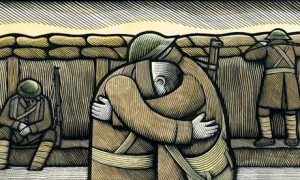 Wilfred Owen, Strange meeting
Wilfred Owen, Strange meeting
> Rimbaud, L’addormentato della valle
> De Andrè, La guerra di Piero
“Strange Meeting” è una poesia di Wilfred Owen che tratta le atrocità della prima guerra mondiale. È stata scritta nel 1918 e pubblicata nel 1919 dopo la morte di Owen.
Sembrava che fossi sfuggito alla battaglia
giù per un profondo cupo tunnel,
scavato da tempo immemorabile nel granito
[…]
Poi, mentre li scrutavo, uno si alzò e mi fissò
con gli occhi sbarrati pieni di pietà,
riconoscendomi, sollevando mani inerti
come per benedire.
E dal suo sorriso capii
che quella cupa galleria era l’Inferno […]
‘Strano amico’, dissi,
‘qui non c’è motivo di piangere’.
‘Nessuno’, disse l’altro,
‘eccetto gli anni non vissuti,
la perdita della speranza.
Qualunque sia la tua speranza, […]
Io sono il nemico che tu hai ucciso,
amico mio.
Ti ho riconosciuto in questa oscurità
Perché eri così corrucciato ieri
quando sferravi il colpo con la baionetta
per uccidermi.
Io cercai di proteggermi,
ma le mie mani erano fredde e pesanti.
Riposiamo ora….
“Strange Meeting” is a poem by Wilfred Owen which deals with the atrocities of World War I. It was written sometime in 1918 and it was published in 1919 after Owen’s death.
It seemed that out of the battle I escaped
Down some profound dull tunnel, long since scooped
Through granites which Titanic wars had groined.
Yet also there encumbered sleepers groaned,
Too fast in thought or death to be bestirred.
Then, as I probed them, one sprang up, and stared
With piteous recognition in fixed eyes,
Lifting distressful hands as if to bless.
And by his smile, I knew that sullen hall;
By his dead smile I knew we stood in Hell.
With a thousand fears that vision’s face was grained;
Yet no blood reached there from the upper ground,
And no guns thumped, or down the flues made moan.
“Strange friend,” I said, “Here is no cause to mourn.”
“None,” said the other, “Save the undone years,
The hopelessness. Whatever hope is yours,
Was my life also; I went hunting wild
After the wildest beauty in the world,
Which lies not calm in eyes, or braided hair,
But mocks the steady running of the hour,
And if it grieves, grieves richlier than here.
For by my glee might many men have laughed,
And of my weeping something has been left,
Which must die now. I mean the truth untold,
The pity of war, the pity war distilled.
Now men will go content with what we spoiled.
Or, discontent, boil bloody, and be spilled.
They will be swift with swiftness of the tigress,
None will break ranks, though nations trek from progress.
Courage was mine, and I had mystery;
Wisdom was mine, and I had mastery;
To miss the march of this retreating world
Into vain citadels that are not walled.
Then, when much blood had clogged their chariot-wheels
I would go up and wash them from sweet wells,
Even with truths that lie too deep for taint.
I would have poured my spirit without stint
But not through wounds; not on the cess of war.
Foreheads of men have bled where no wounds were.
I am the enemy you killed, my friend.
I knew you in this dark; for so you frowned
Yesterday through me as you jabbed and killed.
I parried; but my hands were loath and cold.
Let us sleep now. . . .”
Copyright © 2013 giorgiobaruzzi. All Rights Reserved.

